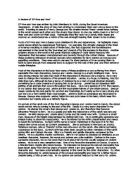In her drama “Bold Girls”, Rona Munro has created a relevant and inspiring legacy of war-torn Northern Ireland. Her drama depicts the daily struggles and predicaments faced by four particular women, who seem to thrive on their fantasies and illusions all except Deirdre who is marked out as different from the drama’s beginning:
“Deirdre is not in this room, she’s crouching on all fours on her own talking
out of darkness in which only her face is visible.”
Introduced as a surreal and somewhat eerie character it is no surprise that Deirdre contrasts greatly with the three other women. It is her persistent search for the truth that polarises her from the others and causes her to be at odds with them as they shut out truth and cushion themselves with their idealistic dreams. This idea of fantasy versus reality is a main concern within the play, and it is through monologues and stage direction that we are allowed a deeper understanding of each character’s situation and of the play’s themes.
A particular monologue of Deirdre’s undoubtedly confirms that her search for truth will result in the hurt of others and possible confrontations and violent conflicts:
“The lights change
I need a knife a wee blade of my own…It was the knife he was talking
about. It was the truth. I thought I’d like that. A wee bit of hard truth
you could hold in your hand and point where you liked.
The lights change”
I believe this monologue verifies Deirdre’s role as “catalyst”. By this point we have been introduced to all four women and to their dreams and fantasies, which Deirdre’s “wee blade” of truth threatens to destroy. Deirdre’s yearning for the truth causes her to kill these dreams, bringing the three idealistic women crashing back to the harsh reality that surrounds them. Deirdre’s conflict is greatest with the central character, Marie. Compared with Cassie and Nora’s materialistic dreams of redecorating her living room (Nora) and leaving Belfast (Cassie), Marie’s delusions of her late husband’s heroic acts and credibility are not as empty as her friends’. These dreams are instilled within objects in the womens’ homes; for example Nora’s dream is symbolised by a “peach polyester mix”, Cassie’s by a wad of money hidden behind Michel’s photograph and Marie’s by a “grainy blow up” of her late husband, Michael. As the play progresses it becomes apparent that Deirdre is intent on destroying each character’s dream, but I think it is also suggested that she is somewhat linked with Marie and her dream. Munro again makes use of symbolism to connect these two characters. For example, Deirdre’s mini dress is reminiscent of Marie’s wedding dress:







